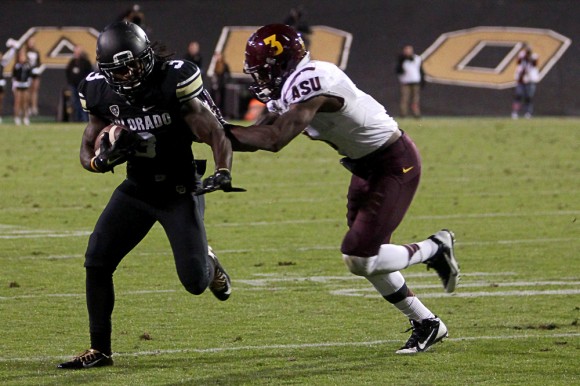
Colorado wide receiver D.D. Goodson outruns Arizona State defensive back Damarious Randall on Saturday, Sept. 13 at Folsom Field in Boulder. (Gray Bender/CU Independent)
Last week was progress. At least, that’s what teams like Colorado call competitive 14-point losses to ranked opponents. Saturday’s on-field results were doubtlessly a step forward — as Buffaloes head coach Mike MacIntyre said during a press conference Tuesday, Colorado fought “to the bitter end” against Arizona State.
Even more heartening was how the Colorado players acted after the loss. They were angry. Sophomore quarterback Sefo Liufau was upset in his post-game press conference. Everyone else, MacIntyre said, was upset in the locker room. The Buffs felt they should have won, and they were perhaps three plays from doing so.
The logical question, then, is when that progress will turn into results. An ideal result this week would be a dominant win over Hawaii. The Rainbow Warriors are the second of three Colorado opponents that finished 1-11 in 2013. The first, Massachusetts, battled the Buffs harder than any anticipated. Hawaii was (somehow) even worse than the Minutemen last year; the Rainbow Warriors had to stave off a comeback by a 3-9 Army team in the last game of the season to avoid going winless.
This year, though, Hawaii is more of an enigma. It has lost to two Pac-12 schools already — by one point to Washington in the season opener and a strange contest to Oregon State a week later. Against the Beavers, the Rainbow Warriors trailed 38-7 in the fourth quarter before scoring the game’s final 23 points.
Despite the competitive final scores, Hawaii hasn’t played well this year. Head coach Norm Chow is an offensive legend; he was offensive coordinator or position coach to three Heisman Trophy-winning quarterbacks (Ty Detmer, Carson Palmer, Matt Leinart), and he won national championships at Brigham Young and Southern California. But Chow’s offenses at Hawaii have been moribund. The Rainbow Warriors have never finished better than 72nd in the nation in scoring offense during his tenure.
This year, Hawaii’s offense is still a mess. Sophomore quarterback Ikaika Woolsey is completing only 47 percent of his passes, which is better than his rate as a freshman. He has thrown just one touchdown pass through three games. Woolsey is a great athlete, and MacIntyre praised his ability to throw on the run, but his inaccuracy becomes more costly with how much the Rainbow Warriors throw the ball (Woolsey is sixth in the nation in passing attempts). Woolsey has good weapons, if he could get them the ball — lanky sophomore Marcus Kemp and shifty senior Scott Harding, who is also Hawaii’s punter and punt returner.
Colorado’s run defense has not so much played football this season as it has impersonated Swiss cheese. It is lucky that it won’t face monstrous senior running back Joey Iosefa, who is out at least four weeks with an ankle injury. His backup, sophomore Steven Lakalaka, has not cracked four yards per carry in his career and has scored only a single touchdown this year.
The Buffs’ rushing offense has struggled this season too, until they gashed Arizona State for 232 yards at six per carry. They likely won’t see that success against Hawaii, who has held opponents to barely three yards a pop on the ground. Colorado will instead attack the Rainbow Warriors’ undersized secondary. Defensive backs Ne’Quan Phillips and Dee Maggitt will struggle to cover the Buffs’ surprisingly productive receiving corps — junior Nelson Spruce leads the nation with six touchdown catches and freshman Shay Fields has been deadly after the catch.
Putting up points won’t be the problem. But Colorado cannot again allow 38 points to a 1-11, non-major conference team, like it did to UMass, and expect victory. If Hawaii’s anemic offense scores that many points, the Buffs have made far less progress than we thought.
Contact CU Independent Staff Writer Tommy Wood at thomas.c.wood@colorado.edu.
